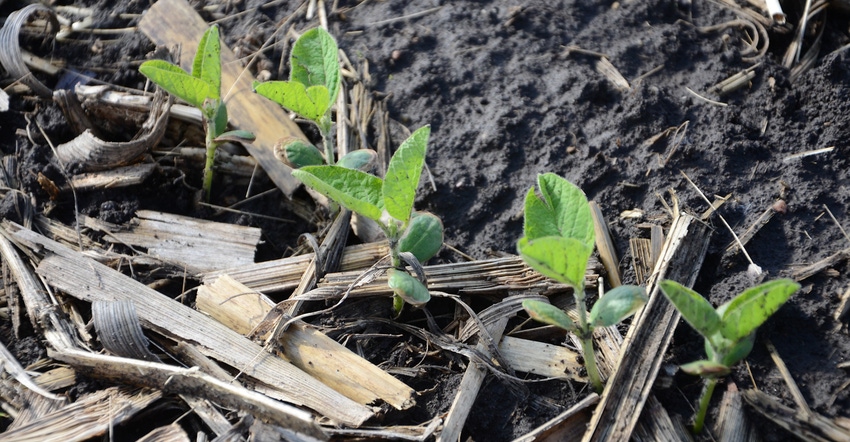December 20, 2016

Soybeans are an excellent rotational crop in the Midwest. They offer solid income potential and provide other agronomic benefits. They're also susceptible to a range of diseases that can keep them from reaching yield potential.
Seed treatments have grown significantly as a tool for getting soybean stands off to a solid start. Yet there are challenges to soybean production that also cause issues for the seed treatments used. Farm Industry News talked with Todd Mayhew, seed protection product development manager, Valent, about the issue. The company has a new seed treatment, but he also discussed some interesting agronomic facts about soybeans that play into both disease control and the value of seed treatments.
He notes that there's a heavy reliance on seed treatment products because soybeans are planted in a short timeframe. "In key states where soybeans are grown 40 to 60% are planted in a 10-day window," he said. "That can concentrate the effects of an adverse weather event."
If a majority of soybeans are planted at the same time and conditions are right for a disease outbreak that can add up to yield trouble. Yet that's how it seems to work out most years given weather, corn planting timing (soybeans are the 'rotational' crop) and other factors. "If you get 50% of the soybeans planted in a good weather window, and conditions turn cold and wet, a greater percentage of soybeans can be subject to seedling diseases," Mayhew said.
From the early days of seed treatments, the target disease has been Pythium - an ever-present disease that can reach out and strike a soybean plant within 90 minutes of planting of conditions are right. The key product for managing Pythium is metalaxyl, which is sold under a number of trade names.
Valent has a new seed treatment product - Intego Suite Soybean - for the market that adds a new mode of action to the mix. A key practice for stopping resistance, which Mayhew says university researchers are already finding. He notes that both metalaxyl or mefenoxam are commonly used in both corn and soybeans - have the same mode of action. In essence, you may think you're changing things up with a crop rotation, but for Pythium management you are not. Mayhew points to work at Ohio State University by Anne Dorrance that showed that the common seed treatments containing metalaxyl or mefenoxam for Pythium had little action on many different species and isolates within species found in the field. "There's not been a new product for preventing oomycetes diseases including Pythium and Phythophthora - since metalaxyl was introduced in 1979," Mayhew pointed out.
Newest mode of action for Pythium
Mayhew explained that the new seed treatment from his company - Intego - is a new mode of action product for seed treatment use. The company produced a white paper outlining how metalaxyl works as a systemic and how the new product works in tandem to prevent disease.
Intego – or ethaboxam e - works in the root zone and is not as systemic. "This product was developed first and foremost as a seed treatment and we've had it in screening programs since 2007," Mayhew says. "We were really blown away by the results we were getting under field conditions."
He notes that part of that response could be based on the proliferation of different Pythium species in the soil - many that have become tolerant to metalaxyl and mefanoxam. "We talk about Pythium as if it is a single species but it is a communityof species," he says. "And the different species favor different temperature conditions."
Intego Suite includes both the new active ingredient and metalaxyl in a premix that can be applied at the dealership. Valent is working with dealers in its network. The product also works for corn as well, though the initial announcement was for soybeans. Valent is talking with seed companies for the future.
You can learn more about Intego Suite by visiting fightsoybeandisease.com.
About the Author(s)
You May Also Like






